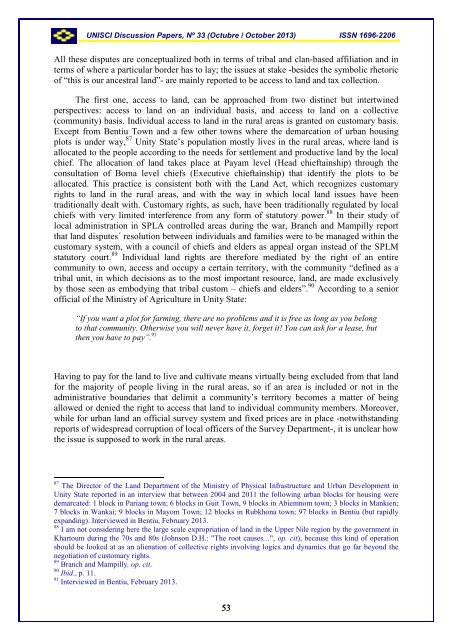UNISCI - Universidad Complutense de Madrid
UNISCI - Universidad Complutense de Madrid
UNISCI - Universidad Complutense de Madrid
You also want an ePaper? Increase the reach of your titles
YUMPU automatically turns print PDFs into web optimized ePapers that Google loves.
<strong>UNISCI</strong> Discussion Papers, Nº 33 (Octubre / October 2013) ISSN 1696-2206All these disputes are conceptualized both in terms of tribal and clan-based affiliation and interms of where a particular bor<strong>de</strong>r has to lay; the issues at stake -besi<strong>de</strong>s the symbolic rhetoricof “this is our ancestral land”- are mainly reported to be access to land and tax collection.The first one, access to land, can be approached from two distinct but intertwinedperspectives: access to land on an individual basis, and access to land on a collective(community) basis. Individual access to land in the rural areas is granted on customary basis.Except from Bentiu Town and a few other towns where the <strong>de</strong>marcation of urban housingplots is un<strong>de</strong>r way, 87 Unity State’s population mostly lives in the rural areas, where land isallocated to the people according to the needs for settlement and productive land by the localchief. The allocation of land takes place at Payam level (Head chieftainship) through theconsultation of Boma level chiefs (Executive chieftainship) that i<strong>de</strong>ntify the plots to beallocated. This practice is consistent both with the Land Act, which recognizes customaryrights to land in the rural areas, and with the way in which local land issues have beentraditionally <strong>de</strong>alt with. Customary rights, as such, have been traditionally regulated by localchiefs with very limited interference from any form of statutory power. 88 In their study oflocal administration in SPLA controlled areas during the war, Branch and Mampilly reportthat land disputes´ resolution between individuals and families were to be managed within thecustomary system, with a council of chiefs and el<strong>de</strong>rs as appeal organ instead of the SPLMstatutory court. 89 Individual land rights are therefore mediated by the right of an entirecommunity to own, access and occupy a certain territory, with the community “<strong>de</strong>fined as atribal unit, in which <strong>de</strong>cisions as to the most important resource, land, are ma<strong>de</strong> exclusivelyby those seen as embodying that tribal custom – chiefs and el<strong>de</strong>rs”. 90 According to a seniorofficial of the Ministry of Agriculture in Unity State:“If you want a plot for farming, there are no problems and it is free as long as you belongto that community. Otherwise you will never have it, forget it! You can ask for a lease, butthen you have to pay”. 91Having to pay for the land to live and cultivate means virtually being exclu<strong>de</strong>d from that landfor the majority of people living in the rural areas, so if an area is inclu<strong>de</strong>d or not in theadministrative boundaries that <strong>de</strong>limit a community’s territory becomes a matter of beingallowed or <strong>de</strong>nied the right to access that land to individual community members. Moreover,while for urban land an official survey system and fixed prices are in place -notwithstandingreports of wi<strong>de</strong>spread corruption of local officers of the Survey Department-, it is unclear howthe issue is supposed to work in the rural areas.87 The Director of the Land Department of the Ministry of Physical Infrastructure and Urban Development inUnity State reported in an interview that between 2004 and 2011 the following urban blocks for housing were<strong>de</strong>marcated: 1 block in Pariang town; 6 blocks in Guit Town, 9 blocks in Abiemnom town; 3 blocks in Mankien;7 blocks in Wankai; 9 blocks in Mayom Town; 12 blocks in Rubkhona town; 97 blocks in Bentiu (but rapidlyexpanding). Interviewed in Bentiu, February 2013.88 I am not consi<strong>de</strong>ring here the large scale expropriation of land in the Upper Nile region by the government inKhartoum during the 70s and 80s (Johnson D.H.: "The root causes…", op. cit), because this kind of operationshould be looked at as an alienation of collective rights involving logics and dynamics that go far beyond thenegotiation of customary rights.89 Branch and Mampilly, op. cit.90 Ibid., p. 11.91 Interviewed in Bentiu, February 2013.53
















